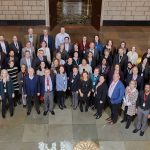This week, we highlight an innovative tool to drive transparency and integrity in publishing, signpost the conference proceedings from the 2024 OASPA Conference and dissect the impact of AI on academic research publishing. We also explore the future of open access and examine the potential financial impact of open access models on publishers, authors and readers. Finally, we take a closer look at the evolving role of compliance in the context of medical communications.
To engage with:
Publication Facts Label webinar via Open Universal Science
On 21 November, the Public Knowledge Project (PKP) invites Open Journal Systems users to a webinar presenting the Publication Facts Label (PFL), an innovative tool developed to support transparency and integrity in publishing. Hosted by John Willinsky (Founder of the PKP), this webinar will shine a spotlight on the role of PFL and share insights on how to get involved in the pilot programme.
Next steps for the declaration on open research information via Zenodo
Signatories of the Barcelona Declaration on Open Research Information are committed to driving the transition to openness in the production and communication of research. In September, supporters and interested parties met in Paris, France, to share progress on the initiative and discuss priorities for the future of the declaration. Organizations are now invited to sign up by 30 November to participate in working groups to map the priority actions from this meeting. Working group topics include evaluating open data, evidence of benefits, funding metadata, journal article and book metadata, metadata on research outputs in institutional repositories, preprint and data repositories, replacing closed systems and sustaining infrastructures.
To watch:
OASPA conference via OASPA | 15–80-minute watch
We are excited to share that the conference proceedings from the Open Access Scholarly Publishing Association (OASPA) 2024 Conference in Lisbon, Portugal, in September are now available. Highlights from this packed 3-day meeting include the importance of equity, routes to open access publishing, the real-world impact of open access, and the potential of open access as a tool for collective climate action.
The rise of AI in academic publishing via Taylor & Francis | 30-minute watch
“We have a duty to tackle the copyright and integrity issues that AI poses with clear policies, standards, and best practices to ensure the protection of authors’ rights, the quality of research and the trustworthiness of publications”, says Priya Madina (Vice President, External Affairs and Policy at Taylor & Francis). During this discussion on the influence of AI, Priya proposes opportunities for the responsible and accountable use of AI in academic publishing, while emphasizing concerns and challenges with its misuse. This session also discusses the ongoing development of regulatory policies to address the evolving AI landscape.
To read:
The future of open access via The Scholarly Kitchen | 15-minute read
How can we ensure that conversations about open access extend beyond removing paywalls? In this article, Todd Carpenter (Executive Director at the National Information Standards Organization) highlights the importance of accessibility and examines the tools and guidance available to address barriers to inclusive access.
The financial challenges of open access publishing via The Publication Plan | 2-minute read
In 2025, the Nelson Memo, ensuring free, immediate and equitable access to federally funded research in the USA, will come into effect. This article prompts discussions around the financial impact on publishers and authors as the open access landscape evolves.
The cost of green open access for readers via The Scholarly Kitchen | 7-minute read
The green open access model, also known as self-archiving, seeks to navigate the financial barriers associated with the gold open access model. In this article, author Lisa Janicke Hinchliffe (Professor and Coordinator for Research Professional Development at the University of Illinois Urbana-Campaign) explores the implications of the green open access approach for readers, and ultimately advocates for gold open access publishing as a route to equitable access to research information.
The influence of GenAI on academic research via LSE | 6-minute read
“For better or worse, Generative Artificial Intelligence (GenAI) is being integrated into academic research”. This article reports on a nationwide survey of researchers in universities in Denmark that explored how GenAI is being used in academic research across different disciplines and demographics.
To listen to:
Navigating compliance in medical communications via The Publication Plan | 20-minute listen
In this conversation with guest host Cassie Stox (Vice President of Media Strategy & Audience Insight at MedThink Inc.), Merry Saba (Lead CMO Publication Standards at Sanofi) and Megan Weigel (Regional Medical Liaison at TG Therapeutics, Inc.) describe their experiences of the evolving role of compliance in medical communications and share insights on the influence of compliance on company policies, procedures and processes.
Enjoy our content? Read last week’s digest and check out our latest guest blog!
Don’t forget to follow us on Twitter/X and LinkedIn for regular updates!






